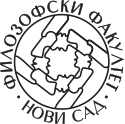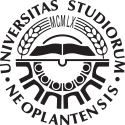15MKMK029 - History of Aesthetics
| Course specification | ||||
|---|---|---|---|---|
| Course title | History of Aesthetics | |||
| Acronym | 15MKMK029 | |||
| Study programme | Hungarian language and literature | |||
| Module | ||||
| Type of study | first degree undergraduate academic studies | |||
| Lecturer (for classes) | ||||
| Lecturer/Associate (for practice) | ||||
| Lecturer/Associate (for OTC) | ||||
| ESPB | 3.0 | Status | ||
| Condition | Oblik uslovljenosti | |||
| The goal | The goal of the course is to enable gaining of knowledge in relation to the basic aesthetic problems. The aim of the course is to articulate the problems and phenomena of aesthetic thinking, and to present the relevant texts in the domain of aesthetics. | |||
| The outcome | The students will identify the original texts of the most significant authors in aesthetics concerning Hungary and the world, the difference between theoretical and aesthetic approaches as well as the connections amongs literary aesthetics, case studies of film, photography and aesthetic aesthetics. | |||
| Contents | ||||
| Contents of lectures | The concept and subject of the traditional aesthetics. Aesthetic and casual experience. The beauty as the universal object of aesthetics. Excerpts from the history of ancient aesthetics. The issues of mimesis and catharsis. Interpretations of the beauty in middle age. Classical German aesthetics, moments of taste, Kant. Schiller, Goethe. The world as will and play. Aesthetics of the 20th century, modernism and aesthetics of ugliness. Position of Hungarian theoreticians related to esthetics. | |||
| Contents of exercises | ||||
| Literature | ||||
| ||||
| Number of hours per week during the semester/trimester/year | ||||
| Lectures | Exercises | OTC | Study and Research | Other classes |
| 2 | 0 | |||
| Methods of teaching | Lecture with discussion work | |||
| Knowledge score (maximum points 100) | ||||
| Pre obligations | Points | Final exam | Points | |
| Activites during lectures | 10 | Test paper | ||
| Practical lessons | Oral examination | 70 | ||
| Projects | ||||
| Colloquia | ||||
| Seminars | 20 | |||

